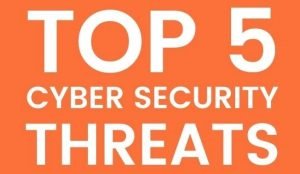stay one step ahead in the digital realm by acquainting yourself with the Top 5 Cybersecurity Threats that every internet user should be aware of. In an era where our lives are increasingly intertwined with technology, understanding these threats is vital to safeguard your sensitive information and protect yourself from potential harm.
This comprehensive guide highlights the most prevalent cybersecurity risks and provides essential insights into their nature and potential impact. By familiarizing yourself with these threats, such as phishing attacks, malware infections, identity theft, ransomware attacks, and social engineering, you will be better equipped to recognize warning signs and take necessary precautions.
Empower yourself with knowledge and elevate your cybersecurity awareness to confidently navigate the digital landscape, ensuring a safer online experience for yourself and your digital assets.
Phishing Attacks
Phishing attacks involve tricking users into revealing sensitive information through deceptive emails, messages, or websites. Cybercriminals often pose as trustworthy entities, such as banks or online service providers, to gain access to personal data. Phishing attacks can result in financial loss or identity theft.
Solution: To stay protected from phishing attacks, follow these steps:
a) Be cautious of unsolicited emails or messages asking for personal information. Verify the sender’s identity before responding or clicking on any links.
b) Pay attention to the email’s language, grammar, and spelling mistakes, as these can be indicators of phishing attempts.
c) Avoid clicking on links in emails or messages. Instead, manually enter the website address into your browser or use trusted bookmarks.
d) Install an email filter or security software that detects and blocks phishing attempts. These tools can identify suspicious links or email content and prevent them from reaching your inbox.
Malware Infections
Malware refers to malicious software designed to gain unauthorized access, damage systems, or steal sensitive information. It can be spread through infected email attachments, malicious websites, or compromised downloads. Malware can result in data loss, system crashes, or unauthorized access to personal information.
Solution: To protect yourself from malware infections, implement the following measures:
a) Keep your operating system and applications up to date with the latest security patches. Software updates often include bug fixes and security enhancements.
b) Install a reputable antivirus software and regularly update its virus definitions. Antivirus software scans your system for known malware and helps prevent infections.
c) Be cautious of downloading files or clicking on links from unknown or untrusted sources. Verify the legitimacy of the source before initiating any downloads.
d) Practice safe browsing habits. Avoid visiting suspicious websites or clicking on pop-up ads, as they may lead to malware infections.
Identity Theft
Identity theft involves stealing personal information to commit fraud, access financial accounts, or perform unauthorized activities in someone’s name. Cybercriminals can obtain sensitive data through data breaches, social engineering, or weak security measures. Identity theft can have severe consequences, including financial loss and damage to your reputation.
Solution: Protect yourself from identity theft by implementing the following safeguards:
a) Use strong and unique passwords for all your online accounts. Avoid using common phrases or personal information that can be easily guessed.
b) Enable two-factor authentication (2FA) whenever possible. 2FA adds an extra layer of security by requiring a second form of verification, such as a code sent to your mobile device, in addition to your password.
c) Be cautious of sharing personal information online, especially on social media platforms. Review your privacy settings and limit the amount of personal information visible to the public.
d) Regularly monitor your financial accounts and credit reports for any suspicious activity. Report any unauthorized transactions or signs of identity theft immediately to your financial institutions.
Ransomware Attacks
Ransomware is a type of malware that encrypts files on a victim’s computer, rendering them inaccessible until a ransom is paid. Ransomware attacks can be devastating for individuals and organizations, resulting in data loss and significant financial damage.
Solution: Protect yourself from ransomware attacks with the following measures:
a) Regularly back up your important files and store them securely. Having offline backups ensures that you can restore your data in the event of a ransomware attack.
b) Be cautious of opening email attachments or downloading files from untrusted sources. Verify the authenticity of the sender before downloading any attachments.
c) Use reputable antivirus software with real-time scanning and behaviour-based detection to prevent ransomware infections.
Read: How to Protect Your Privacy Online: Tips and Tools
d) Keep your operating system and applications updated with the latest security patches. Software updates often include security enhancements that address known vulnerabilities exploited by ransomware.
Social Engineering
Social engineering involves manipulating individuals into revealing confidential information or performing actions that benefit the attacker. This can include impersonating someone, exploiting trust, or using psychological manipulation. Social engineering attacks can lead to unauthorized access, data breaches, or financial loss.
Solution: Protect yourself from social engineering attacks by following these guidelines:
a) Be skeptical of unsolicited requests for personal information, even if they appear to come from a trusted source. Verify the identity of individuals or organizations before sharing sensitive information.
b) Educate yourself about common social engineering techniques and warning signs. Stay informed about the latest tactics used by cybercriminals to manipulate individuals.
c) Implement security awareness training for yourself and your employees if applicable. Training can help individuals recognize and respond to social engineering attempts effectively.
d) Implement strict security protocols, such as multi-step verification processes, for accessing sensitive information or performing critical actions.
Finally, by understanding and being aware of these top cybersecurity threats, you can take proactive measures to protect yourself and your sensitive information online. Remember to practice safe browsing habits, keep your software updated, use strong passwords, and employ additional security measures such as two-factor authentication and reputable antivirus software.
Stay informed about the latest cybersecurity trends and regularly educate yourself on best practices to maintain a secure digital presence. With vigilance and the right precautions, you can navigate the online world with confidence.
